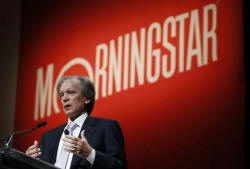|
 Central
banks 'running out of time' to reflate economies: Bill
Gross Central
banks 'running out of time' to reflate economies: Bill
Gross
 Send a link to a friend
Send a link to a friend
[March 30, 2016]
By Jennifer Ablan
NEW YORK (Reuters) - Bond manager Bill
Gross, who runs the Janus Global Unconstrained Bond Fund, said central
banks are "running out of time" to reflate global economies as their
aggressive policies including quantitative easing and low, even
negative, interest rates are losing their effectiveness.
|
|
 In his April Investment Outlook, Gross wrote that markets and the
capitalistic business models based upon them and priced for them
"will begin to go south" if global economies do not produce growth. In his April Investment Outlook, Gross wrote that markets and the
capitalistic business models based upon them and priced for them
"will begin to go south" if global economies do not produce growth.
Given massive monetary stimulus, Gross said nominal gross domestic
product growth rates for the U.S. should be between 4 percent and 5
percent by 2017 while that for the euro zone should be between 2
percent and 3 percent, respectively.
On Monday, the Federal Reserve Bank of Atlanta's GDPNow model
predicted U.S. growth at a 0.6 percent pace in the first quarter,
marked down from an earlier estimate of 1.4 percent.

In Japan, nominal GDP should be between 1 percent and 2 percent
while China should be between 5 percent and 6 percent by 2017, Gross
added.
"Capital gains and the expectations for future gains will become
Giant Pandas – very rare and sort of inefficient at reproduction,"
Gross said. "I'm saying that developed and emerging economies are
flying at stall speed and they've got to bump up nominal GDP growth
rates or else. Cross your fingers."
Gross warned against investing in negative-yielding securities.
[to top of second column] |

"The real market and the real economy await a different conclusion
as losses from negative rates result in capital losses, not capital
gains," he said. "Investors cannot make money when money yields
nothing. Unless... nominal GDP can be raised to levels that allow
central banks to normalize short-term interest rates, then south
instead of north is the logical direction for markets."
(Reporting By Jennifer Ablan; Editing by Chizu Nomiyama)
[© 2016 Thomson Reuters. All rights
reserved.] Copyright 2016 Reuters. All rights reserved. This material may not be published,
broadcast, rewritten or redistributed.
 |